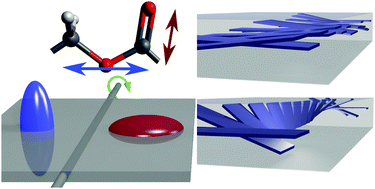Temperature-dependent IR-transition moment orientational analysis applied to thin supported films of poly-ε-caprolactone†
Abstract
A novel experimental setup is described which enables one to carry out infrared transition moment orientational analysis (IR-TMOA) depending on temperature. By this, three dimensional molecular order parameter tensors of IR-active transition dipole moments with respect to the sample coordinate system can be determined in their thermal evolution (35 °C < T < 59 °C). As an example crystallinity and macroscopic order of poly-ε-caprolcatone are monitored. Both remain largely unaltered up to T ∼ 50 °C, above which they decrease. These reductions are explained as the melting of flat-on crystalline lamellae that make up about 34% of the crystalline material. The remaining crystallites are arranged into bulk-like, confined spherulitic structures and do not melt by more than (3 ± 3)%. Therefore, flat-on oriented lamellae are supposed to be kinetically favored by confinement during melt crystallization but are thermodynamically less stable than two-dimensionally confined bulk-like spherulites.



 Please wait while we load your content...
Please wait while we load your content...